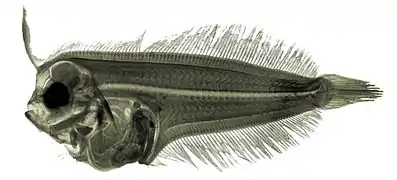| Mediterranean scaldfish | |
|---|---|
 | |
| A fully grown scaldfish from the southern North Sea | |
 | |
| A scaldfish larva, measuring approximately 9 millimetres (0.35 in) in length | |
| Scientific classification | |
| Domain: | Eukaryota |
| Kingdom: | Animalia |
| Phylum: | Chordata |
| Class: | Actinopterygii |
| Order: | Pleuronectiformes |
| Family: | Bothidae |
| Genus: | Arnoglossus |
| Species: | A. laterna |
| Binomial name | |
| Arnoglossus laterna (Walbaum, 1792 ) | |
| Synonyms | |
The Mediterranean scaldfish (Arnoglossus laterna), also known as the scaldfish, is a species of benthic left eyed flatfish belonging to the family Bothidae.[2] It is found in the eastern Atlantic of Europe and Africa as well as the Mediterranean, and is of minor interest to fisheries.
Description
The Mediterranean scaldfish is a small flatfish with a slender oval body, a small head with large eyes placed on the left side of the head. It has an oblique mouth which is moderately sized. The dorsal fin has its origin in front of its upper eye, the first dozen or so dorsal fin rays are partially fee from the fin membrane, although they are not elongated. The pelvic fin on the eyed side has a long bas and is larger than its equivalent on its blind side. It has 87-93 rays in its dorsal fin and 65-74 rays in the anal fin. Its scales are thin and fragile and there are usually very few on its body. It is pale brownish grey in colour with dark spots on its body and fins, with a dusky spot on the pelvic fins.[3] The lateral line has 50-56 scales.[4] It is a sexually dimorphic species in which the males are distinguished by having an unusual appearance with of certain fin rays being elongated. This species grows up to 25 cm in total length.[5]
Distribution
The Mediterranean scaldfish has a wide distribution which extends from Trondheim[4] in the north southwards along the eastern Atlantic Ocean to Angola. It also extends into the Mediterranean Sea and the Black Sea,[6] as well as Madeira.[1]
Habitat and biology
The Mediterranean scaldfish is found on the upper part of the continental shelf[6] where it has a benthic habit on mixed or muddy substrates down to about 200m[4] and feeds on small fishes and invertebrates. Their breeding season is from May to August.[6] It metamorphoses into an adult from a larva when it is between 16mm and 23mm in length and off the coast of Brittany it may live for up to eight years.[1]
Fisheries
The Mediterranean scaldfish is of minor commercial importance and the catch tends to be sold in local markets. In the northeastern Mediterranean it is normally discarded from bottom trawl catches. It is caught in commercial trawlers as by-catch in the eastern central Atlantic but again it is usually discarded. Some of this by-catch by industrial fisheries is utilized by artisanal fisheries and is consumed in fresh or dried form.[1]
References
- 1 2 3 4 Tous, P.; Sidibé, A.; Mbye, E.; de Morais, L.; Camara, Y.H.; Adeofe, T.A.; Munroe, T.; Camara, K.; Cissoko, K.; Djiman, R.; Sagna, A.; Sylla, M. (2015). "Arnoglossus laterna". IUCN Red List of Threatened Species. 2015: e.T198724A15538689. doi:10.2305/IUCN.UK.2015-4.RLTS.T198724A15538689.en. Retrieved 18 November 2021.
- ↑ "Arnoglossus laterna (Walbaum, 1792)". Integrated Taxonomic Information System. Retrieved 18 November 2010.
- ↑ Alwyne Wheeler (1992). The Pocket Guide to Salt Water Fishes of Britain and Europe (1997 ed.). Parkgate Books. p. 160. ISBN 1855853647.
- 1 2 3 J.C. Hureau (ed.). "Fishes of the NE Atlantic and Mediterranean". Marine Species Identification Portal. ETI Bioinformatics. p. Scaldfish (Arnoglossus laterna). Retrieved 18 March 2018.
- ↑ Ruiz, A. (2007). Tyler-Walters H.; Hiscock K. (eds.). "Arnoglossus laterna Scaldfish". Marine Life Information Network: Biology and Sensitivity Key Information Reviews, [on-line]. Plymouth: Marine Biological Association of the United Kingdom. Retrieved 18 March 2018.
- 1 2 3 Froese, Rainer; Pauly, Daniel (eds.) (2012). "Arnoglossus laterna" in FishBase. September 2012 version.
External links
- "Arnoglossus laterna". Catalogue of Life. Species 2000: Leiden, the Netherlands.
